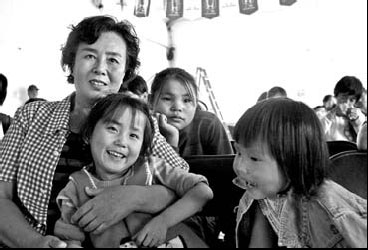A ray of sunshine for wronged children
|
Zhang Shuqin, 62, a former policewoman, has established seven Sun Villages around China in the past 15 years. Provided to China Daily |
Zhang Shuqin is a parent to 4,000 children, the sons and daughters of imprisoned criminals who have no one else to turn to.
"Criminals are duly punished but their kids are innocent," says the 62-year-old who has established seven Sun Villages around China in the past 15 years.
If it was not for Zhang, these children would be hungry, discriminated against, prey to illness and psychological problems, and likely school dropouts.
The former policewoman, for 16 years, in Shaanxi province, later became an editor and writer for a prison newsletter, which she says gave her an insight into prisoners' lives.
A survey by the Ministry of Justice showed at the end of 2005, that of 468,000 prisoners, especially those from rural areas, 45.9 percent of their children were not cared for adequately and just 5.2 percent had received assistance.
The survey showed 2.5 percent of them were homeless and had to beg to survive; 1.2 percent of them committed crimes; and 82.4 percent dropped out school after their parents were imprisoned.
In 2006, civil affairs departments took responsibility for these children.
Zhang set up the first Sun Village in Shaanxi, in 1995, "to bring some sunshine into the lives of those children and their parents".
Depending on private donations, Sun Village covers the living and education expenses of the children while their parents are imprisoned, and arranges at least one visit a year and one phone call a month for the kids.
Prison administrators send the majority of children to Sun Village, others are referred by the parents of inmates, or neighborhood committees.
Due to long-term neglect or as a result of negative influence from their parents, many of the children have psychological and learning problems, a Sun Village survey has shown.
"These children are a hidden problem in society and need proper guidance," says Liu Tiegang, a children's psychiatrist based in Beijing.
While older children are under pressure and may develop inferiority complexes because of the parents' incarceration, younger kids are prone to panic attacks, Liu says.
To help out, Sun Village provides psychological counselors and all the staff, even the canteen employees, are trained to communicate with the children.
Sun Village provides a stable family environment and is a good place for them to deal with their negative emotions, Liu says, adding parents should send messages of love to their children to help them through this difficult period.
Peng Yongzhen, 48, had been sentenced to four years in prison for harboring the proceeds of her husband's robbery, and says that, naturally, the estrangement between her and her twin daughters caused her much pain.
"My daughters don't want to talk to me, and they don't want to sleep in the same room with me," says Peng, who was released from prison in 2004. While in prison, her daughters were sent to Sun Village as there were no relatives to look after the girls.
In prison, she often cried because she felt so sorry for her children.
"Imprisoned mothers are extremely excited to receive a letter from their children, even if it's just simple sentences, like, 'I'm fine; please don't worry, mom'," Peng says.
She says Sun Village provides a good environment for children and "many of them don't want to go home when their family comes to get them back".
"We hope to give them a sense of security and trust," Zhang says. "Thousands more kids need help, far more than my Sun Villages can cope with. Our society should build a 'sun system' for them," Zhang says.
China Daily
(China Daily 01/04/2011 page20)

















